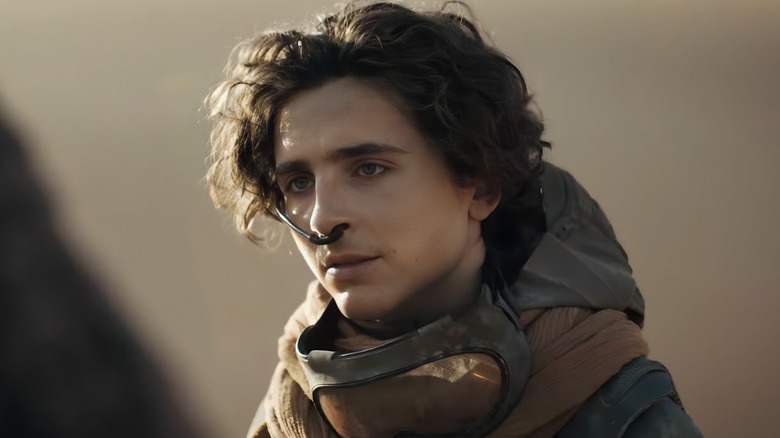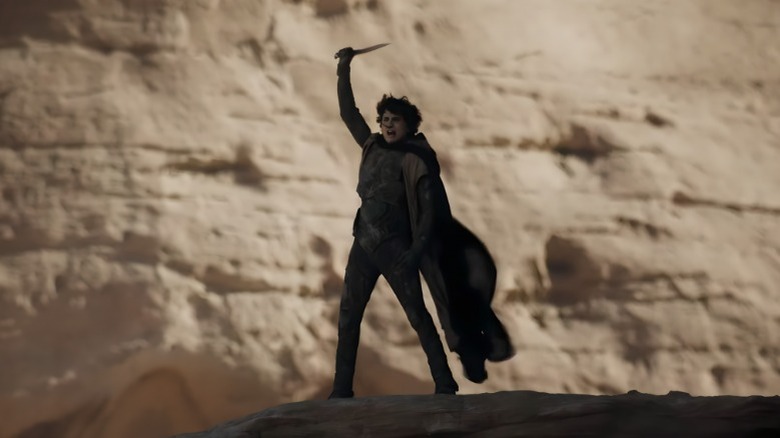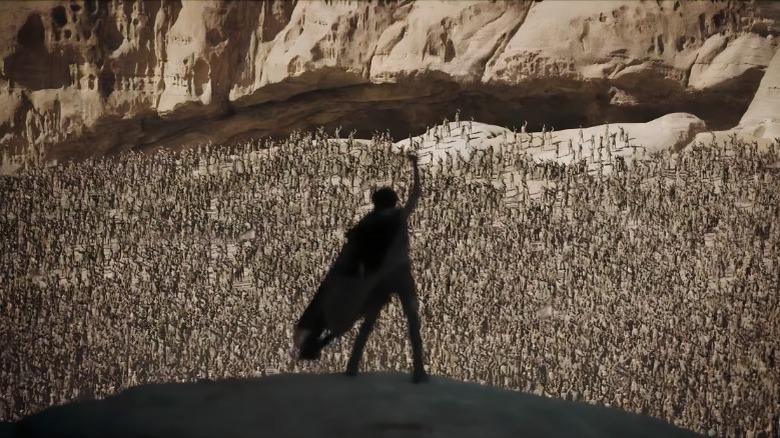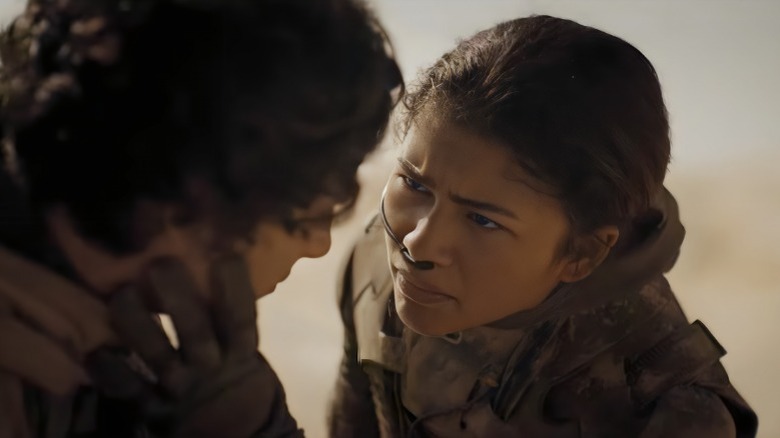Dune: Part 2 Will Stun People Who Haven't Read The Book, Because Paul Isn't The Hero You Think He Is
Contains potential spoilers for Denis Villeneuve's "Dune" movie series
If you haven't been living in a sietch these past two years, then you have heard about Denis Villeneuve's ambitious adaptation of "Dune." Frank Herbert's 1965 novel was the precursor to all mainstream fare that followed. ("Star Wars," anyone?) Villeneuve certainly hasn't been the first to adapt the book series, but he is the most flashy. Which is probably the reason he has been getting flak for it. And if there is one thing that the Internet hates, it's anything popular. Critics have railed against the film for propping up Paul "White Savior" Atreides (Timothée Chalamet). At first glance, they don't appear to be wrong.
White-presenting Paul is a literal chosen one meant to liberate the subjugated indigenous people of a desert planet. And if that was all the film was, they would be right. However, many people who have not read the books may fail to realize the subtitle in Villeneuve's "Dune: Part One." Not only is there a second part, but there is a whole mess of parts that culminate into one fact: Paul is the villain. Contrary to what many people believe, being the villain and a protagonist are not mutually exclusive. Book readers know exactly what dark path Paul goes down and it isn't pretty. The road to hell is paved with good intentions and after liberating the Fremen, that is exactly where the galaxy ends up.
So what makes Paul so bad?
To be clear: "Dune" is a marathon, not a sprint. As it stands, Paul hasn't done anything truly egregious. But even now, the seeds have already been planted for an Atreides dynasty that lasts thousands of years. "Dune: Part One" depicts Paul making political moves to marry the Emperor's daughter, which will factor into his future war crimes. When Paul defeats the Harkonnens in the books, he knows the only way to protect Arrakis is to crown himself Emperor. But because Paul is Paul, he doesn't form a coup. Instead, he marries Irulan (Florence Pugh) who he considers his wife in name only. After overthrowing her father, that's when things really take a turn for the worst.
Cue: Maud'Dib's Jihad. (Yes, it's how it sounds.) Now entrenched in the Fremen culture and their sandworm religion, Paul spreads this belief throughout the galaxy. Like any good dictator, Paul's actions get out of control quickly. His prescience has advanced so much that he knows what's going to happen, meaning he does nothing to stop the jihad that sterilizes millions of planets. Paul's crimes don't just include the genocide he enacts upon the Known Universe, but how his actions affect future generations. His son Leto II succeeds after him and crowns himself God-Emperor while evolving into a giant sandworm. Not too bad for a 15-year-old boy who just kept dreaming about a cute girl.
Anti-colonialism is the point
Frank Herbert's books are not perfect by any stretch of the imagination. Accusations of fetishizing Middle Eastern influences aren't exactly off-base. But where Herbert shines is the political commentary. There is a reason why his works are replicated and honored throughout sci-fi and fantasy to this day. So what is the point of the saga of Irulan painstakingly chronicling the history of Atreides? Those who refuse to learn history are doomed to repeat it. This is a lesson that is as resonant today as when it was written.
Paul never intends to become a doomed messiah, destined to burn the world. Once, he was just a royal's son, afraid of what a dukedom would mean. But because of his choices, he is set on a path he cannot control. The Jihad he creates to liberate the Fremen starts a domino effect that Paul does not believe he can stop. He has become so warped by his abilities that he has seen every choice and every consequence. Take a look at any history book, and this will seem familiar. Wars start for less noble reasons than Paul's, and the results are still the same.
"Dune" isn't promoting a hero. It's an anti-colonialist take on relevant issues. Take it from Herbert himself who said, "[S]uperheroes are disastrous for humankind. Even if we find a real hero (whatever-or whoever-that may be), eventually fallible mortals take over the power structure that always comes into being around such a leader."
Is Hollywood ready for this?
It shouldn't be unkind to say that Hollywood is about what's marketable. Especially in an age of streaming where Netflix is primarily concerned with metrics, Denis Villeneuve's "Dune" had to have some commercial appeal. Headliners Timothée Chalamet, Zendaya, and Florence Pugh are all incredibly popular young actors. But is this lulling fans into a false sense of security? Or is it making an important message even more accessible?
Not all movie fans have read "Dune," and may be operating under an incredibly misguided understanding of the material. Comparisons to "Star Wars" have not helped. Many may think Paul is just another Luke Skywalker (Mark Hamill). But there is a reason this film is being made now and with the respect that it has. We can all watch "Star Wars" and be wrapped up in a blanket of nostalgia where good things happen for the right reasons. "Dune" will not give you that feeling. It may even be a shock to many.
It is a story that is not a fantasy but one that speaks to viewers' current experiences. The system of oppression that Paul is a part of has obvious connections to the world we live in, and that's the entire point. In a world of Marvel where heroes always make the right decisions, it may be a hard adjustment to make. But you better get on board because "Dune Messiah" is the future if Denis Villeneuve has anything to say about it.



